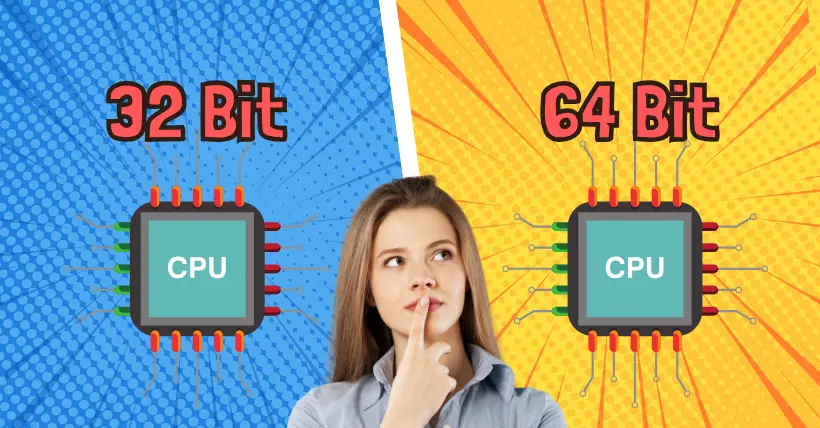On the x86 platform, in theory, a 32 bit CPU can only handle data that is 32 bits wide in a single clock cycle, while a 64 bit CPU can process 64 bits of data in one clock cycle.
01
Handling 64 bit Data
When a 32-bit CPU needs to process 64-bit data, it requires at least two clock cycles. This is because it can only handle 32-bit chunks at a time. Moreover, additional instructions are needed to combine the two 32-bit parts, which increases the number of clock cycles and adds overhead. In contrast, a 64-bit CPU can handle the same 64-bit data in a single clock cycle, providing a clear advantage for handling larger data types like 64-bit integers or 64-bit fixed-point numbers.
However, if the data itself is 32-bit—such as a standard integer or single-precision floating point number—the performance difference between 32-bit and 64-bit CPUs is negligible. In practice, 32-bit values (like unsigned integers from 0 to 4,294,967,295 or signed integers in the range -2,147,483,648 to 2,147,483,647) can cover most common data processing needs.
02
Floating Point Calculations and FPU
For applications involving floating point numbers, which are common in performance-critical tasks, nearly all 32-bit CPUs are equipped with or support Floating Point Units (FPUs). In the x86 architecture, from the 8087 co-processor onwards, the FPU has supported the IEEE 754-1985 standard for floating point arithmetic. This means 32-bit CPUs can handle 32-bit single precision, 64-bit double precision, and even 80-bit extended precision floating point operations.
While not every floating point operation completes in a single clock cycle, the efficiency of handling 32-bit, 64-bit, and 80-bit floating point data on a 32-bit CPU is roughly the same as on a 64-bit CPU. This limits the performance advantage that a 64-bit CPU would have for floating point calculations.
03
Real-World Application Performance
In practice, 64-bit CPUs only show a significant performance advantage over 32-bit CPUs when dealing with 64-bit integers or fixed-point numbers. However, the need to process such large data types is relatively uncommon in many applications. Most business and consumer applications still use 32-bit data, so the performance advantage of a 64-bit CPU in these cases is minimal.
That being said, modern 64-bit CPUs do have other architectural advantages:
- More registers: A 64-bit CPU can access more registers, which helps improve performance.
- Access to more than 4GB of memory: A 64-bit operating system can support systems with more than 4GB of RAM, which is a key limitation of 32-bit systems. This allows a single 64-bit application to use more than 2GB of memory, which is helpful for memory-intensive tasks.
However, these benefits stem more from the broader architecture of modern 64-bit systems (including operating systems and memory handling) rather than from the fundamental difference between 32-bit and 64-bit CPU word widths. A 32-bit CPU could, in theory, support additional registers and manage larger memory spaces with the appropriate extensions, though this isn’t commonly done today.
04
Conclusion
In summary, the 64-bit CPU shows performance advantages primarily when working with 64-bit data, but for most practical applications that use 32-bit data or floating-point calculations, the performance difference between 32-bit and 64-bit CPUs is quite limited. The advantages we associate with modern 64-bit systems—such as support for larger memory spaces—are more related to improvements in architecture and software than the inherent difference in word size between 32-bit and 64-bit processors.

Disclaimer:
- This channel does not make any representations or warranties regarding the availability, accuracy, timeliness, effectiveness, or completeness of any information posted. It hereby disclaims any liability or consequences arising from the use of the information.
- This channel is non-commercial and non-profit. The re-posted content does not signify endorsement of its views or responsibility for its authenticity. It does not intend to constitute any other guidance. This channel is not liable for any inaccuracies or errors in the re-posted or published information, directly or indirectly.
- Some data, materials, text, images, etc., used in this channel are sourced from the internet, and all reposts are duly credited to their sources. If you discover any work that infringes on your intellectual property rights or personal legal interests, please contact us, and we will promptly modify or remove it.








